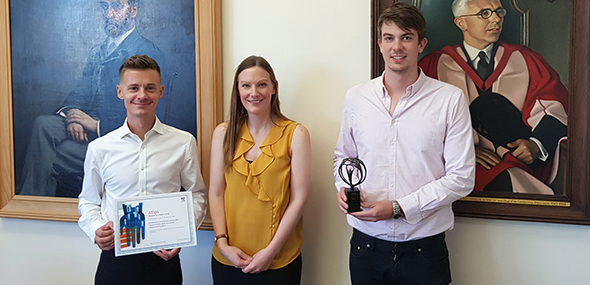
Replacing 10% of sand in concrete with waste plastic may help to reduce the vast amounts of plastic waste on India’s streets, new research reveals.
Typically, when you put an inert, man-made material like plastic into concrete, you lose a bit of strength... The key challenge here was to have a limit between a small reduction in strengths, which we achieved, and using an appropriate amount of plastic to make it worthwhile.
Dr John Orr
The research, led by Dr John Orr, Cambridge Lecturer in Concrete Structures, has shown waste plastic to be a viable partial replacement for sand in structural concrete, providing one possible solution for future sustainable construction while addressing sand shortages in India.
Principal investigator Dr Orr completed the research while working at the University of Bath. The research has since been selected by an international scientific committee to receive the Atlas Award in recognition of: its potential societal impact around the world; for providing a proof of concept for an approach which could significantly address India’s waste and sand shortage problems; and offering a solution for future sustainable construction.
Published in the journal Construction and Building Materials, the research – in partnership with colleagues from Goa Engineering College, India – demonstrates how the team investigated various different types of plastic to see if they could be crushed and used as a replacement for sand, which typically accounts for 30% of a concrete mixture.
The project showed that replacing sand with similarly sized and shaped waste plastic particles from ground up plastic bottles, resulted in concrete which was almost as strong as conventional concrete mixtures. By replacing 10% of sand in concrete, it is calculated this approach could save 820 million tonnes of sand a year, and help reduce levels of plastic waste.

Dr John Orr (left), receives the Atlas Award from Rebecca Barrie (Elsevier). Pictured right is James Thorneycroft, University of Bath.
The researchers investigated this approach by testing concrete cubes and cylinders. Five types of plastic particles, including those from recycled plastic bottles and recycled plastic bags, were trialled in the mixes in a variety of sizes. Recycled plastic bottles, ground and graded to match the sand being replaced, were found to perform best.
As one of the world’s fastest growing economies, a booming construction sector and a rapidly growing urban population, the cost and demand for sand in India has sky-rocketed with 280 megatons of cement manufactured there in 2014 alone.
This has led to unregulated sand extraction from riverbeds; to the extent that such mining is now banned in many Indian states. Also, the high level of sand extraction can lead to other problems such as coastal erosion and an unstable fishing industry.
The country’s rapid development has also meant waste plastic has become a significant problem in India with 15,000 tons of plastic dumped in the streets everyday due to a lack of suitable recycling facilities. Previous research has investigated the potential of partially replacing sand in concrete with crushed car tyres and other similar materials; this led to Dr Orr and his University of Bath team investigating the viability of using plastic waste as a possible alternative to sand.
Dr Orr said: “Typically, when you put an inert, man-made material like plastic into concrete, you lose a bit of strength because the plastic material doesn't bond to the cement paste in the material in the same way that a sand particle would.
“The key challenge here was to have a limit between a small reduction in strengths, which we achieved, and using an appropriate amount of plastic to make it worthwhile. It is really a viable material for use in some areas of construction that might help us to tackle issues of not being able to recycle the plastic and meeting a demand for sand.”
The research was funded by the British Council under the UK India Education and Research Initiative (UKIERI) programme, established in 2006 to foster greater educational links between the countries, including knowledge sharing and student mobility.
The full research team consisted of Dr John Orr (University of Cambridge), Dr Richard Ball and James Thorneycroft (University of Bath), and Professor Purnanand Savoikar (Goa Engineering College, India).
Reference:
J. Orr et al. ‘Performance of structural concrete with recycled plastic waste as a partial replacement for sand.’ Construction and Building Materials (2018). DOI: 10.1016/j.conbuildmat.2017.11.127
This article has been edited from the University of Bath website.

